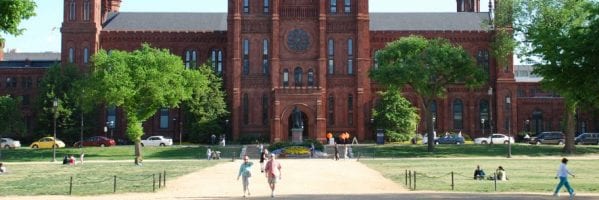The 5 Best DC Part-Time MBA Programs

The necessity of continuing to work while pursuing an MBA is a reality for many students. Part-time programs, built to fit into work and family schedules, are an increasingly sought after format for the MBA. The DMV metro area is home to some of the top part-time MBAs in the country. Here is a look at five of the best Washington DC part-time MBA programs.

Virginia Tech’s Pamplin School of Business’ evening part-time program recently jumped three places to 14th in U.S. News and World Report‘s rankings. Also ranked as the top public university part-time degree, the evening program at Pamplin begins in spring or fall, and can take anywhere from two-to-five years to complete, with the average student receiving an MBA in 3.5 years.
Part-time students at Pamplin can choose how many courses to take each semester, and the highly flexible format is fit for professionals who may be searching for a way to shift in their current career. According to Dean Robert Sumichrast, part of what makes Pamplin a leader in part-time education is its awareness of the needs of the working professional. “What we did at Virginia Tech a few years ago was to say that we really want to focus on the working [student]—someone who wants to enhance their career or make a change in the direction of their career … We want [professionals] to use what they’ve learned as part of the experience of the MBA program.”

Johns Hopkins’ Carey School of Business’ Flexible MBA also has the success of the working student at its forefront. With a degree “proven to get six-figure results” Carey’s flex MBA is online, in-person, or in a blended format. The program’s average length is 2.7 years and is comprised of 54 credits. With concentrations in Healthcare Management, Leading Organizations, and Marketing, the online courses are offered in eight-week terms. The in person delivery method, also comprised of eight-week terms, offers the additional concentrations of entrepreneurship, financial businesses, interdisciplinary business, and real estate and infrastructure.
While graduates of the Carey Flex MBA program succeed in a wide variety of industries, recent data shows that 67 percent of students landed in consulting positions, and 33 percent took roles in healthcare.

The University of Maryland’s Smith School of Business, allowed one part-time MBA student, Marie-Anne Audige, ’17, to realize that she was “much more resilient than I thought I was … Smith allowed me to take a leap of faith to start my business.” With classes available at three different campuses (Shady Grove, Downtown D.C. and Baltimore), Smith’s part-time MBA is one of the “most versatile MBA programs in the Washington D.C. region.”
With several different options available—24 months, 28 months, or a flexible, self-paced duration—Smith’s degree meets the professional in the middle between their education and career. Smith offers frequent info sessions, both in person and online, for those who wish to learn more about the flex programs in person. Classes are offered throughout the year in four terms.

Loyola University’s Sellinger School of Business also ranked among U.S. News and World Report’s top part-time MBA programs. Sellinger Professional MBAs may complete the program’s 33-42 credits at a self created pace, in as many as six years or as few as two and a half. Encouraging “students to align personal interests and career goals” with the curriculum, Sellinger has a wide variety of specializations from which to choose; professional MBAs can major in data analytics, finance, accounting, and marketing to name just a few.

Kogod School of Business at American University offers its top-ranked part-time online degree in a 24-month course sequence (completed by most students), but it can also be completed on a 12-month, 15-month, or 18-month track. Comprised of 48 credits, there are 12 core courses, three electives, and two in-person immersions.
The Kogod MBA is pointed squarely at helping businesses to grow, as stated on the program’s site. “The online MBA program prepares students to apply leadership and financial analysis skills to help businesses operate more effectively”. Students can choose from six concentrations or can customize their degree to their specific career goals. Concentrations include Business Analytics, Finance, International Business, Cybersecurity and Marketing.
Washington D.C. MBA Programs That Do Not Require Work Experience

There are plenty of benefits to going straight from undergrad into an MBA program: among them, getting a jump start on your business education, opening doors for leadership roles early on and the ability to avoid losing a year or two of progress and salary after already starting a career. Unfortunately, minimum work requirements for many MBA programs make this impossible.
Thankfully, some MBA programs do not require a minimum amount of professional experience in order to apply to their program. For students looking for a head start on their MBA while pursuing their business education in a top U.S. metro area, there’s no reason you can’t get your degree—and use it too.
Below is a list of MBA programs located in the Washington D.C. metro area that do not require prior professional experience in order to be considered for admission.
McDonough School of Business – Georgetown University
Although the average student earning their MBA at McDonough has two years of work experience under their belt, prior work is not a requirement for admission. A résumé will be required, however, less to see how much each applicant has spent developing their career, but to evaluate the progress and impact that they’ve made so far.
Other requirements for admission include an application form, GMAT/GRE scores, one recommendation, transcripts, personal essays and the possibility of an invitation-only interview.
Robert H. Smith School of Business – University of Maryland
According to the admission criteria for the Smith school of business, “a solid background of several years of work experience strengthens an applicant’s profile and makes him or her more competitive in the job market upon graduation.” Nonetheless, work experience is not a direct requirement for admission.
Other requirements include one’s undergraduate academic record, graduate admission tests (GMAT or GRE), résumé, letter of recommendation and well-written personal essays. Through any or all of these other requirements, students have plenty of opportunity to prove their future success in the program- even without prior professional experience.
Sellinger School of Business – Loyola University Maryland
Work experience is not required for Sellinger’s “Emerging Leaders MBA” program, which based its admissions decisions on prior academic achievement and leadership potential.
Students are further required to submit a written personal statement, two professional references, GMAT/GRE scores and qualitative criteria that allows admissions officials to determine each student’s leadership potential, including: undergraduate performance, certifications and awards, extracurricular involvement and community engagement. Select applicants will be invited to interview over Skype.
Carey Business School – Johns Hopkins University
Requirements for all MBA programs at Carey Business School include transcripts from all schools attended in the U.S., résumé, two personal essays, one letter of recommendation and GMAT/GRE scores.
Work experience is preferred for pursuing most advanced degrees at Carey, but is not a requirement of the Global MBA program. Nevertheless, students in the Global MBA program tend to average two to five years of professional experience.
Sellinger School of Business Spices Up Professional’s MBA Curriculum

According to a press release, Loyola University Maryland’s Sellinger School of Business and Management has revised the curriculum for its Professional’s MBA program. The updated curriculum comes into effect in the upcoming fall semester.
Continue reading…
